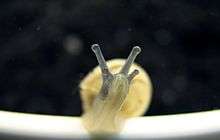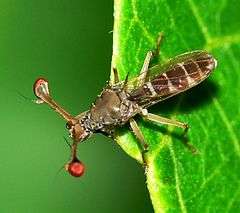Eyestalk

Pulmonate land snails usually have two sets of tentacles on their head: the upper pair have an eye at the end; the lower pair are for olfaction.[1]

- This article is about eyes mounted on stalks. For the instinctive tendency to track prey, see eye-stalking.
In anatomy, an eyestalk (sometimes spelled as eye stalk or known as an ommatophore) is a protrusion that extends the eye away from the body, giving the eye a better field of vision.[1] It is a common feature in nature and frequently appears in fiction.
In nature
In nature, eyestalks are sometimes called "tentacles", and may also have olfactory organs at their ends; examples of creatures with olfactory eyestalks include snails, the trilobite superfamily Asaphida, and the fly family Diopsidae. In slugs and snails, these tentacles will regrow if severely damaged, and in some species, are rectractable.[1] The tentacles of aquatic snails do not regrow.[2]
See also
References
- 1 2 3 "Slug and Snail Anatomy". All About Slugs. Retrieved 7 December 2015.
- ↑ "Snails and Slugs (Gastropoda) - The Tentacles of Snails". The Living World of Molluscs. Retrieved 8 December 2015.
This article is issued from
Wikipedia.
The text is licensed under Creative Commons - Attribution - Sharealike.
Additional terms may apply for the media files.
